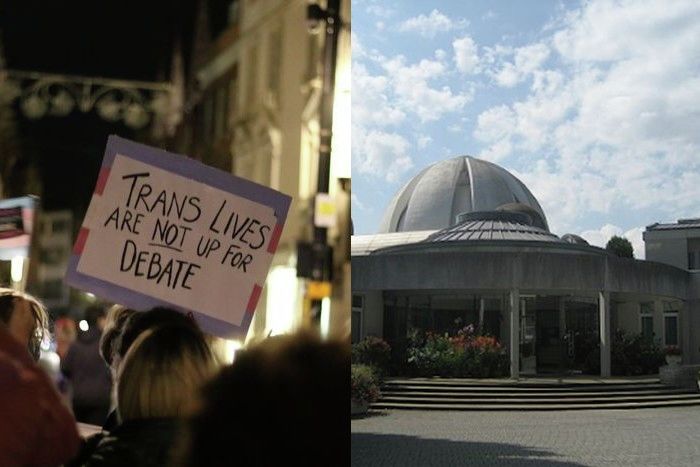A week in Cambridge science: King’s meadow, Ukraine war and solar power breakthrough
The Science team highlight the most important research from Cambridge this week

No Mow May? King’s College scientists investigate the environmental effects of its wildflower meadow
The meadow in King’s College’s “iconic back lawn” had boosted biodiversity and is more resilient to climate change, according to research led by the College’s scientists.
“The move has saved nearly as much emissions as a flight from London to New York”
Dr Cicely Marshall, a researcher at King’s College and the University of Cambridge’s Department of Plant Sciences, led a study to monitor the effects of the change in 2020 to let the wildflower meadow in King’s College “bloom” in a breakaway move that left 300 years of upkeep.
The study used biodiversity surveys to compare species richness, abundance and composition of plants and bugs supported by the meadow, and remaining lawn, over three years, finding that it is supported over three times more species.
Letting the King’s College meadow grow naturally has saved nearly as much emissions as a flight from London to New York. The study found that reducing maintenance and fertilising of the meadow saved an estimated 1.36 tonnes of carbon emissions per hectare per year when compared with lawn. The meadow was also found to counteract the “urban heat effect” in Cambridge, reflecting 25% more sunlight.
“Cambridge has become more prone to drought, and last summer most of the College’s fine lawns died. It’s really expensive to maintain these lawns, which have to be re-sown if they die off. But the meadow just looked after itself,” says Marshall.
Dr Claudia Schneider, a researcher in the University’s Department of Psychology, suggests that “Well-respected, prominent institutions like King’s College can act as role models that may influence public opinion.”
Cambridge scientists are ‘driving on sunshine’: Breakthrough for solar-power renewable fuels
A group in the Department of Chemistry have found a way to use the same ingredients as plants use in photosynthesis to produce high-energy-density fuels that can be used to replace fossil fuels in cars.
“We can make things that are directly useful as we transition away from fossil fuels”
“Shining sunlight on the artificial leaves and getting liquid fuel from carbon dioxide and water is an amazing bit of chemistry,” said Dr Motiar Rahaman, fellow of St John’s College.
Alternative fuels made from crops such as corn are already used extensively in the US as a greener way to power cars. But they face a key issue – they use agricultural land that is needed for food production. The novel “artificial leaves” solution developed by Cambridge scientists has a major advantage in allowing the production of ethanol-based fuels without giving up farmland.
“Even though there’s still work to be done, we’ve shown what these artificial leaves are capable of doing,” said Professor Erwin Reisner who led the research. “It’s important to show that we can go beyond the simplest molecules and make things that are directly useful as we transition away from fossil fuels.”
Cambridge’s study of online search data during Russia–Ukraine war: ‘Russian people are not passive subjects’
Cambridge’s Bennett Institute for Public Policy has found, through an online study of public sentiment in Russia, that the invasion of Ukraine “did not lead to a national war rally in happiness and life satisfaction among the Russian population”, contrary to official polling agencies.
Levels of wellbeing and morale in Russia “may be close to their lowest in a decade, with internet search data revealing a limited appetite among ordinary Russians for the war”, the report found.
Russian public sentiment was assessed using data from Google Trends on a daily basis from 2012 until April 2023, with were thought to represent a “much wider selection of the population” than social media data. The results painted a picture of public mood deteriorating, with searches for terms linked to “tacit dissent” rising sharply, despite Russian polling after the invasion indicating that Putin’s ratings leap to 80%.
“Web searches are felt to be private, and often reflect internal thoughts and anxieties that people would not wish to broadcast. Such data provides insight into the public consciousness within repressive states, where truth is hidden by a fog of fear and disinformation,” said Dr Roberto Foa, co-director of the Cambridge Centre for the Future of Democracy.
 Comment / Cambridge’s tourism risks commodifying students18 April 2025
Comment / Cambridge’s tourism risks commodifying students18 April 2025 News / Varsity ChatGPT survey17 April 2025
News / Varsity ChatGPT survey17 April 2025 News / Cambridge researchers build tool to predict cancer treatment success19 April 2025
News / Cambridge researchers build tool to predict cancer treatment success19 April 2025 News / Cambridge researchers find ‘strongest evidence yet’ of life on distant exoplanet18 April 2025
News / Cambridge researchers find ‘strongest evidence yet’ of life on distant exoplanet18 April 2025 News / Greenwich House occupiers miss deadline to respond to University legal action15 April 2025
News / Greenwich House occupiers miss deadline to respond to University legal action15 April 2025






